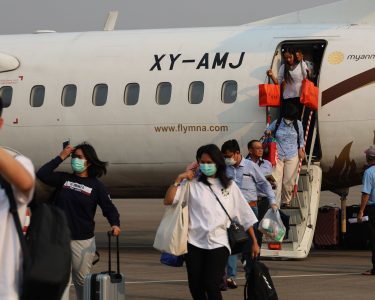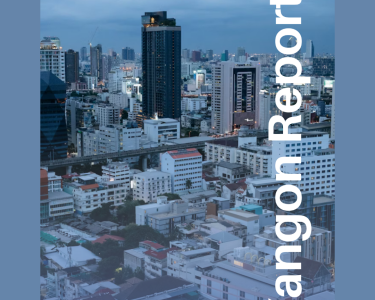Myanmar Investment Review
Nearly 200 business and investment leaders across Myanmar came together on September 18, 2025 at Novotel Yangon Max to celebrate the Mid-Autumn Festival during the Third Intra-Chambers Networking Event 2025. Organized by multiple foreign and domestic chambers of commerce, the event served not just as a cultural celebration but as a platform for deal-making, forging relationships, and strengthening cooperation among a broad spectrum of industries.
The atmosphere was vibrant, with representatives from chambers such as the British Chamber of Commerce Myanmar, EuroCham Myanmar, the Japanese Chamber of Commerce and Industry, the French Myanmar Chamber, and others engaging in wide-ranging conversations—from regulatory challenges to shared supply chain opportunities.
Chambers of Commerce: Key Players in Myanmar’s Business Ecosystem
Chambers of commerce in Myanmar have long acted as bridges between the private sector and government, especially in times when the regulatory environment can shift rapidly. The Union of Myanmar Federation of Chambers of Commerce & Industry (UMFCCI), founded in 1919, remains one of the most influential bodies for trade, regulation, and policy advocacy. Foreign and bilateral chambers—such as those from the EU, Japan, France, and the UK—play increasingly active roles in facilitating foreign direct investment, sharing international best practices, and helping their members navigate risks unique to Myanmar.

Business Environment: A Mixture of Promise and Precaution
Myanmar’s business landscape continues to present both opportunity and risk. On one hand, the country holds high potential in sectors like agribusiness, manufacturing, digital services, and infrastructure—especially given its strategic location in Southeast Asia and its natural resource base. On the other, companies frequently contend with political instability, regulatory ambiguity, currency fluctuations, and infrastructure bottlenecks.
Against this backdrop, chambers are not just networking platforms—they are vital institutions for information exchange, advocacy, and stabilizing expectations between private firms, regulators, and international stakeholders.
Myanmar Employment Market
The Employment market in Myanmar has seen many changes over the last few years, particularly due to the competition for talent as well as retention of staff within many organizations; however the country and employers continue to demonstrate their resilience to move forward where possible.
The number of job vacancies over the last year have shown signs of a positive upturn throughout all industries of the economy despite a shortage of qualified white collar professionals in the market, with a significant move towards affordable white, blue and grey collar workers..
Read More: Myanmar’s JobNet Presents to Cambodian Business Delegation, Eyes Cambodia Launch
Justin Sway, Group CEO of JobNet.com.mm (for white collar professionals, Alote.com.mm (for blue and grey collar workers) and JobNet.com.kh (for the Cambodia market) stated that there has been a tangible increase in business confidence. “Currently, our JobNet and Alote websites has seen a spike of 20% or more in job vacancies, which is an extremely positive sign for the economy and for job seekers looking to find work.”

Value of Physical Events
Harrison White, CEO of CIR Media, has spoken previously about the resilience and vitality of Yangon’s private sector despite political and economic uncertainty. In his view, physical networking events such as the Intra-Chambers gathering are essential.
“Physical events in Yangon provide what no digital platform can fully replicate: the nuance of face-to-face interaction, the trust built over shared spaces, and the kind of spontaneous conversations that often lead to partnership or investment,” Harrison said.
He added that after years of disruption—due to political instability, travel restrictions, and health-related lockdowns—these in-person forums help reset business momentum, align expectations, and allow firms to better understand both local challenges and opportunities. Harrison observed that despite disruptions, many business leaders see these gatherings as strategic investments in relationship capital, which can yield tangible returns when navigating regulatory shifts or seeking joint ventures.
The Venue: Novotel’s Ballroom as Strategic Stage
Organizers chose Novotel Yangon Max’s Grand Yangon Ballroom not only for its prestige but also for its sheer scale and versatility. With a column-free, 1,140 sqm layout and 12-meter high ceiling, it is widely regarded as Yangon’s largest ballroom suitable for major social or corporate events. The hall can accommodate up to 750 banquet guests in a full setup.
Julien A. Péchey, General Manager of Novotel Yangon Max, marked the hotel’s milestone as it enters its 10th year of operations in Yangon. While the property began welcoming events a few years after opening, Péchey emphasized the strategic importance of such flagship assets:
“Ten years into operations in Yangon, we are proud to host the city’s largest ballroom in Ballroom A. It is not just about size — it is a facility built for major gatherings, and our aim has always been to provide a space where business and diplomacy meet seamlessly.”





